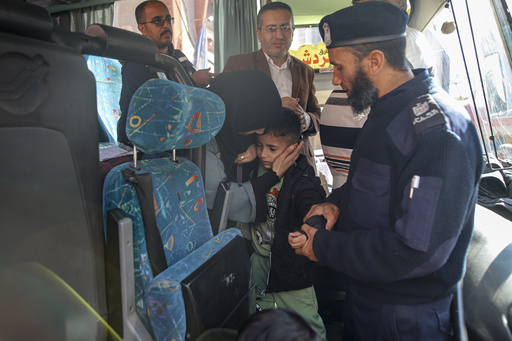
RAFAH CROSSING, Egypt — On Saturday, a group of 50 ill and injured Palestinian children began their transfer into Egypt for medical care, marking the first occasion the Rafah border crossing has been opened since it was captured by Israel nearly nine months ago. Health officials have reported that thousands of additional Palestinians require similar evacuations.
The reopening of the Rafah crossing marks a crucial development that reinforces the ceasefire agreement reached between Israel and Hamas last month. Israel’s decision to reopen the crossing came after Hamas released the last surviving female hostages confined in Gaza. The Rafah crossing is notable as it is the only passage from Gaza that does not lead into Israel.
Footage shared by Egypt’s Al-Qahera television captured images of children being transported on gurneys and swiftly moved to ambulances on the Egyptian side, en route to medical facilities in el-Arish and other nearby areas. One particularly tragic image featured a young girl who had undergone foot amputation.
Zaher al-Wahidi, a representative from Gaza’s Health Ministry, stated that by Saturday evening, 37 children had successfully crossed into Egypt. The ministry also reported that approximately 60 family members accompanied these children.
World Health Organization Director-General Tedros Adhanom Ghebreyesus called for expedited medical evacuations across all possible routes, emphasizing the urgent need for such measures, stating, “Thousands of lives depend on it.”
The children represent the first group in what is expected to be a series of regular medical evacuations of Palestinians through the Rafah crossing for treatment outside the territory.
Over the past 15 months, Israel’s military operations against Hamas have severely impacted Gaza’s healthcare system, rendering most hospitals inoperable amidst a crisis involving over 110,000 wounded individuals due to Israel’s aerial and ground assaults.
Remaining medical facilities are struggling to provide essential treatments or specialized surgeries for various injuries and diseases. Mohammed Zaqout, director of hospitals at Gaza’s Health Ministry, noted that more than 6,000 patients are prepared for evacuation, while over 12,000 others are in urgent need of medical attention. He expressed hope that more individuals would be evacuated, as the current numbers fall short of what is necessary.
Israeli forces initially closed the Rafah crossing in early May following a military operation on southern Gaza. Egypt subsequently halted operations on its side to express its opposition to the situation.
Historically, even prior to the outbreak of hostilities, the Rafah crossing served as a vital escape route for residents of Gaza, where a long-standing Israeli-Egyptian blockade has critically weakened the region’s healthcare system and contributed to widespread poverty. Palestinians frequently sought permission to leave Gaza for life-saving treatments unavailable locally, including chemotherapy.
The reopening of the crossing was achieved following extensive diplomatic negotiations aimed at resolving various security concerns among Israeli, Egyptian, and Palestinian authorities. Since 2007, Hamas has managed the crossing after taking control of Gaza from the internationally recognized Palestinian Authority (PA).
As Israeli troops maintain their presence at the Rafah crossing and in the Philadelphia Corridor—which stretches along the border—Israel has rejected the return of Hamas management over the crossing, accusing them of trafficking weapons through subterranean tunnels. Egypt has insisted that it dismantled these tunnels years ago to prevent smuggling. Additionally, Israel opposes any efforts to transfer control of the crossing to the Palestinian Authority.
Consequently, the crossing will be monitored by Palestinian personnel from Gaza who previously held positions as border officers under the PA, although they will not wear any official PA insignia. A European diplomat provided this information on the condition of anonymity, as they were not authorized to speak publicly about the arrangements. According to the diplomat, these officers have been vetted to ensure no connections to Hamas.
Furthermore, European Union monitors will also be deployed, continuing a presence they maintained prior to 2007.
Discussions regarding the next phase of the agreement, which includes plans for a permanent ceasefire, a complete withdrawal of Israeli forces from Gaza, and the release of remaining hostages, are slated to commence on Monday. Israel has expressed opposition to any plans that would grant the PA governance over post-conflict Gaza.

